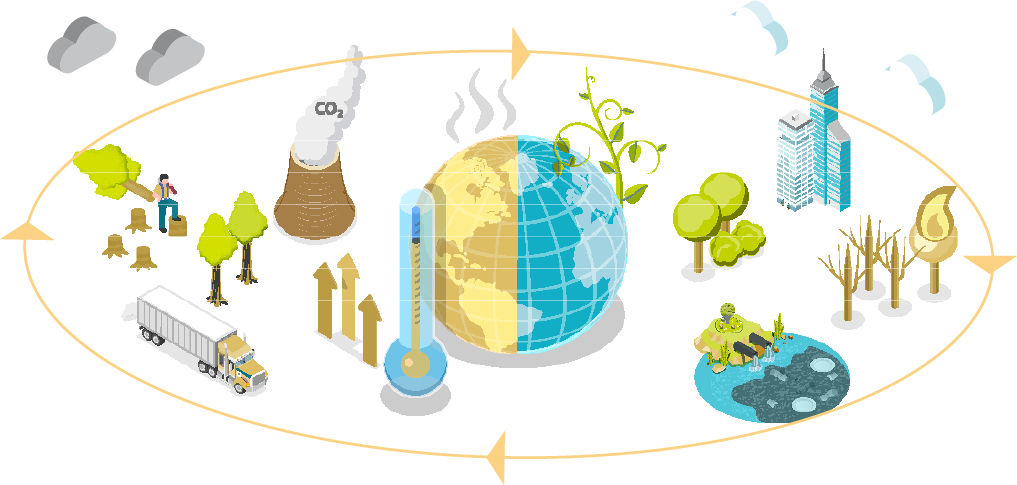
Tackling three main drivers of biodiversity loss with listed equities
- 22 June 2023 (5 min read)
Global human population is increasing rapidly. This is in turn driving greater biodiversity loss, as more species are lost due to increased human resource and habitation requirements.
The size and breadth of biodiversity loss must be halted and addressed now, and on a sufficient scale to achieve the targets arising from the COP15 biodiversity agreement2. This scalability can be achieved through investing in listed equity companies.
There is no net zero without nature

The agriculture sector is to biodiversity what the energy sector is to climate change – namely, its biggest challenge.
Efficient and precise production is becoming a top priority as well as reducing food waste to achieve a more sustainable agriculture system, allowing farmers to use less scarce land and water resources as well as reducing pollution from chemical fertilisers and pesticides.

|
80% of deforestation is linked to agriculture3 |

|
1/3 of the food produced is wasted |
Changing human food consumption is key
This massive land use only fulfils 17% of calories needed globally4 and only provides 33% of global protein4
Fresh Water scarcity

|

|

|
Most of the water on Earth is saltwater, with freshwater making up just 3%5 |
15% of our water supply is lost every year6 |
70% of all fresh water is used by agriculture7 |
Innovative technology such as smart metering and analytics help increase the efficiency of water systems by identifying leaks and reducing water loss.
By 2050 there could be more plastic than fish in the sea8
Fossil-fuel derived plastic dominates the packaging market. Manufacturers are working on the superior circularity features of aluminium and glass.
Consumer behaviour is changing to lessen environmental impact
Digital peer-to-peer platforms promote pre-owned goods, can reduce waste, and promote more sustainable consumption

|
Innovations
|
As we move to a net-zero economy, recycling of scarce resources will need to increase to meet demand as well as reduce the impact on the environment
Sources:
- (1) WWF Living Planet Report 2022. For illustrative purposes only
- (2) https://www.unep.org/news-and-stories/story/cop15-ends-landmark-biodiversity-agreement
- (3) Citi GPS, Food and Climate Change, 2022
- (4) Ibid.
- (5) BofAM, The World Is Not Enough - Scarcity Primer, 2022
- (6) Ibid.
- (7) WWF, 2022
- (8) BofAM, The World Is Not Enough - Scarcity Primer, 2022
- (9) https://www.circularonline.co.uk/news/62-of-businesses-to-invest-more-in-sustainable-packaging-materials/
- (10) BofAM, IEA, Growth of selected minerals in 2040 vs 2020 in «Sustainable Development Scenario».
Disclaimer
The information on this website is intended for investors domiciled in Switzerland.
AXA Investment Managers Switzerland Ltd (AXA IM) is not liable for unauthorised use of the website.
This website is for advertising and informational purpose only. The published information and expression of opinions are provided for personal use only. The information, data, figures, opinions, statements, analyses, forecasts, simulations, concepts and other data provided by AXA IM in this document are based on our knowledge and experience at the time of preparation and are subject to change without notice.
AXA IM excludes any warranty (explicit or implicit) for the accuracy, completeness and up-to-dateness of the published information and expressions of opinion. In particular, AXA IM is not obliged to remove information that is no longer up to date or to expressly mark it a such. To the extent that the data contained in this document originates from third parties, AXA IM is not responsible for the accuracy, completeness, up-to-dateness and appropriateness of such data, even if only such data is used that is deemed to be reliable.
The information on the website of AXA IM does not constitute a decision aid for economic, legal, tax or other advisory questions, nor may investment or other decisions be made solely on the basis of this information. Before any investment decision is made, detailed advice should be obtained that is geared to the client's situation.
Past performance or returns are neither a guarantee nor an indicator of the future performance or investment returns. The value and return on an investment is not guaranteed. It can rise and fall and investors may even incur a total loss.
AXA Investment Managers Switzerland Ltd.